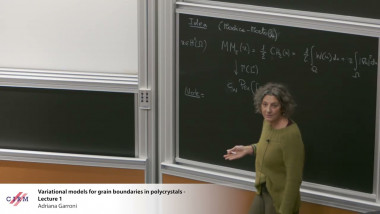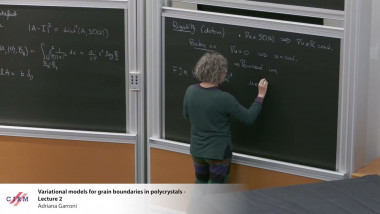
Variational models for grain boundaries in polycrystals - Lecture 1
By Adriana Garroni

Variational models for grain boundaries in polycrystals - Lecture 2
By Adriana Garroni
By Sijue Wu
Appears in collection : Advances in Nonlinear Analysis and Nonlinear Waves, a conference in honor of Frank Merle
It is known since the work of Dyachenko \& Zakharov in 1994 that for the weakly nonlinear 2d infinite depth water waves, there are no 3-wave interactions and all of the 4-wave interaction coefficients vanish on the non-trivial resonant manifold. In this talk I will present a recent result that proves this partial integrability from a different angle.
We construct a sequence of energy functionals $\mathfrak E_j(t)$, directly in the physical space, which are explicit in the Riemann mapping variable and involve material derivatives of order $j$ of the solutions for the 2d water wave equation, so that $\frac d{dt} \mathfrak E_j(t)$
is quintic or higher order.
We show that if some scaling invariant norm, and a norm involving one spacial derivative above the scaling of the initial data are of size no more than $\varepsilon$, then the lifespan of the solution for the 2d water wave equation is at least of order $O(\varepsilon^{-3})$, and the solution remains as regular as the initial data during this time. If only the scaling invariant norm of the data is of size $\varepsilon$, then the lifespan of the solution is at least of order $O(\varepsilon^{-5/2})$.
Our long time existence results do not impose size restrictions on the slope of the initial interface and the magnitude of the initial velocity, they allow the interface to have arbitrary large steepnesses and initial velocities to have arbitrary large magnitudes.
